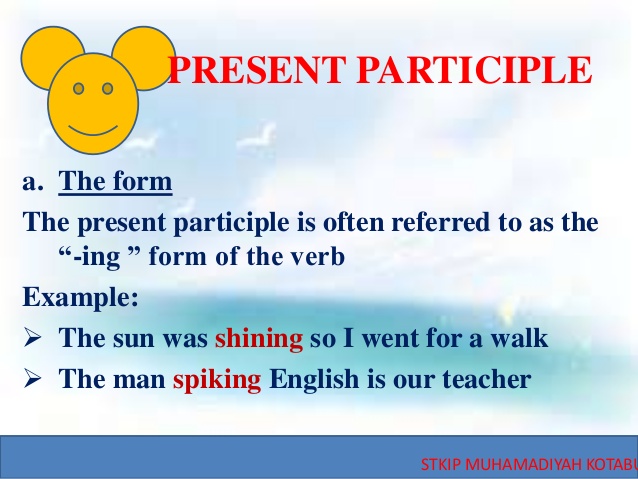** Present Participle:
>Present participles are formed from verbs. Present participles (just like past participles) can be used as adjectives or used to form verb tenses. For example:
The verb: to laugh
The present participle: laughing
The present participle used as an adjective: The laughing boy
The present participle used to form a verb tense: The boy was laughing.
- Do not disturb a sleeping dog.
- Bring me the floating flower.
- Do not get on the running bus.
- The child went to its mother dancing.

# Present Participles in Participle Phrases:
>It is really common to see present participles in participle phrases. A participle phrase also acts like an adjective. In the examples below, the participle phrases are shaded and the present participles are in bold:
- My mother is next to the lady wearing the red hat. (The participle phrase wearing the red hat describes the lady.)
- I know a pond teeming with fish. (The participle phrase teeming with fish describes a pond.)
- Frantically shuffling through her coppers, Jackie hoped to find another silver coin. (The participle phrase Frantically shuffling through her coppers describes Jackie.)
- Relying on Mark’s inability to cast accurately, Lee plonked his bait exactly where Mark had just caught the small pouting. (The participle phrase Relying on Mark’s inability to cast accurately describes Lee.)
# More Examples of Present Participles Used as Adjectives:
>Here are some real-life examples of present participles (shaded) being used as adjectives:
- Always be wary of any helpful item that weighs less than its operating manual. (Terry Pratchett)
- Somewhere on this globe, every ten seconds, there is a woman giving birth to a child. She must be found and stopped. (Sam Levenson, 1911-1980)
- Love is the big booming beat which covers up the noise of hate. (Margaret Cho)
- All existing business models are wrong. Find a new one. (Hugh Macleod)
# Do Not Confuse Present Participles with Gerunds:
>Present participles should not be confused with gerunds,which are nouns formed from verbs. Gerunds also end -ing. For example:
…….I stopped believing in Santa Claus when my mother took me to see him in a department store, and he asked for my autograph. (Shirley Temple) (This is a gerund not a present participle.)
# Details:
** Past Participle:
Past participles are formed from verbs. Past participles (just like present participles) can be used as adjectives or used to form verb tenses. For example:
The verb: to whisper
The past participle: whispered
The past participle used as an adjective: The whispered word
The past participle used to form a verb tense: The message was whispered.
>There are two types of participles:
- The Past Participle (usually ending -ed, -d, -t, -en, or -n)
- The Present Participle (ending -ing)
- This is a book written by Roald Dahl.
- This water is polluted.
- The days gone are sweeter than the days to come.
Past and present participles are classified as verbals. (A verbal is a verb form that functions either as an adjective or a noun.)
>Examples of Past Participles Being Used As Adjectives:
Here are some examples of past participles being used as adjectives:
| The Verb | The Past Participle |
|---|---|
| To swell | swollen eyes |
| To break | broken plate |
| To ruin | ruined cake |
>Past Participles in Participle Phrases:
Past participles can often be found in participle phrases. A participle phrase acts like an adjective. In the examples below, the participle phrases are shaded and the past participles are in bold:
- The boy taken to hospital has recovered. (The participle phrase taken to hospital describes the boy.)
- I have a heart wracked with sorrow. (The participle phrase wracked with sorrow describes a heart.)
- Battered by the wind, John fell to his knees. (The participle phrase “Battered by the wind describes john.)
- Finally broken , Lee lowered his gloves. (The participle phrase Finally broken describes Lee.)
>More Examples of Past Participles Used as Adjectives:
Here are some examples of past participles (shaded) being used as adjectives:
- Here is a laminated copy to replace your torn one.
- Stuffed deer heads on walls are bad enough, but it’s worse when they have streamers in their antlers because then you know they were enjoying themselves when they were shot. (Ellen DeGeneres)
- A torn jacket is soon mended, but hard words bruise the heart of a child. (Henry Longfellow)
- Scandal is gossip made tedious by morality. (Oscar Wilde, 1854-1900)
- The enemy is anybody who’s going to get you killed, no matter which side he’s on. (Joseph Heller, 1923- 1999)
# Details:
** Perfect Participle:
Perfect participles are formed like this: “Having” + [past participle]
>Examples:
- Having taken
- Having eaten
- Having played
>Some more examples of present participles (shaded):
- Having heard the news, he quickly sold his brother’s record collection.
- Having been promised a steak dinner, she looked less than impressed with her Happy Meal.
- Having eaten rice, he went to bed.
- Having said this, he went away.
- Running fast we reached there.
- A dying man wants nothing.
